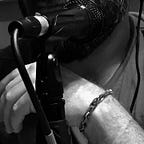How To Make “Turn the Other Cheek” a Posture of Personal Strength
Humility is often misunderstood as weakness
Humility is often categorized along side words like weak, self-deprecating, silent and surrendered. Humility is the posture we are told to adopt so as not to appear prideful, which is, of course, morally wrong.
Systems of faith get bad press for this. Force all your followers to humbly submit to authority, whether in the hierarchy or in the monarchy and you have yourself a neat subservient mass of people to direct.
I want to propose here that the origins of moral and ethical calls toward humility aren’t uniquely intended to push us down in order to prevent us from exalting ourselves too highly.
Rather, the call to humility is in itself a challenge to the power structures that set out to offend, accuse, oppress and enslave us.
Take a look at these three examples from a sermon that Jesus taught.
- If someone slaps you on the cheek, turn also your other cheek to them
- If someone sues you for your shirt, give them your coat also
- If someone asks you to go one mile, go two
Turn the other cheek is the most famous of the three, but all three work together in congruence, giving Jesus’ sermon a touch of rebellion.
That’s right, rebellion.
Everything he taught was a subversion of the power structures that stomp all over our rights and destroy our well-being. Jesus wasn’t supporting the one who sues or the slapper. Jesus was giving his hearers a lesson in subversion. He was attempting to teach them how to disarm the powers that be. He does this by illustrating three areas of our personal space.
Our material goods, our productivity and our physical bodies.
Until now, the greatest logic for retaliation was “an eye for an eye” and “a tooth for a tooth”. Fight fire with fire, as it were. Whoever comes out on top is the victor, but to be the victor you have to be the strongest. Jesus comes along and redefines strength.
If someone slaps you on the cheek…
No one ever got ahead by letting people slap them on the cheek, and we’re told to turn the other cheek for a second attack. But that’s not what he’s saying at all. He’s telling us how not to and how to respond to evil that comes against us. Whereas some would find that a fist begets a fist, Jesus says, there’s one way to bring down a bully.
Never back down.
Don’t look at the offended here. Look at the offender. Why is he slapping? Why is he physically abusing? He wants action, results, power, influence over you. And Jesus says, stick out your chin and let him know, he has no power over you. Stand unmoved at his force. Don’t back down. Don’t surrender. Don’t cower in the corner. Jesus is teaching how to respond to oppressors. He’s not teaching us to be submissive to bullies.
“No, don’t hit them back. Stand.”
Stay in the middle of the street. Keep marching. Stand on your feet again. Say, you can’t and won’t break me. You have no power here. (If you’re the bully by the way, give thanks for the times that someone stood against you. I am.)
If someone sues you for your shirt…
Then he addresses our personal goods. Here someone is being overpowered by someone else seeking to take a portion of what belongs to him. Jesus responds by saying, in that case, give him your coat as well.
This opportunity may come in some literal sense in your life, but He’s not saying that if Small Business A gets sued by Big Business B, give them double the settlement money.
Someone who recognizes that true power belongs to those who supply and not to those who take, has no need to fear loss of the insignificant things. If we begin at a position where personal materials and things are transient and meant to be used for good rather than consumption, there is no opportunity for loss.
People who fight on Black Friday are consumed with taking, hoarding and consuming. Someone who gives their time, talent, and treasure liberally could never be offended at the loss of a $325 television.
If someone asks you to go one mile…
Finally, he moves to the sphere of our productivity or the demands that are made on our time by those stronger than us. At this time the Roman military could compel a citizen to carry his burden for up to a mile. Packs and food supplies on the backs of the people rather than the man with the sword. They were enslaved to another person’s will.
Jesus makes a strong subversive statement here. You are no one’s slaves. You belong to no one but God. What you are is the source. Your work is profitable. Your labor is valuable. Dedicate yourselves to the labor of the goodwill of all men. The tide raises all boats. You cannot enslave what is already volunteered.
The true balance in the world will come when there is no more power structure and all people live in community and equality with one another. When we have pushed forward the rights of all humankind two miles, what bully will be left to need us to carry his armor?
The most powerful person is the one who provides, and not the one who takes. The victor will always be the one who stands, and not the one who strikes down. Those who go the furthest are those who serve, not those who enslave.
In these three statements, Jesus informs the crowd that they can overcome any aggression by exceeding the demands of evil by works of goodwill.
